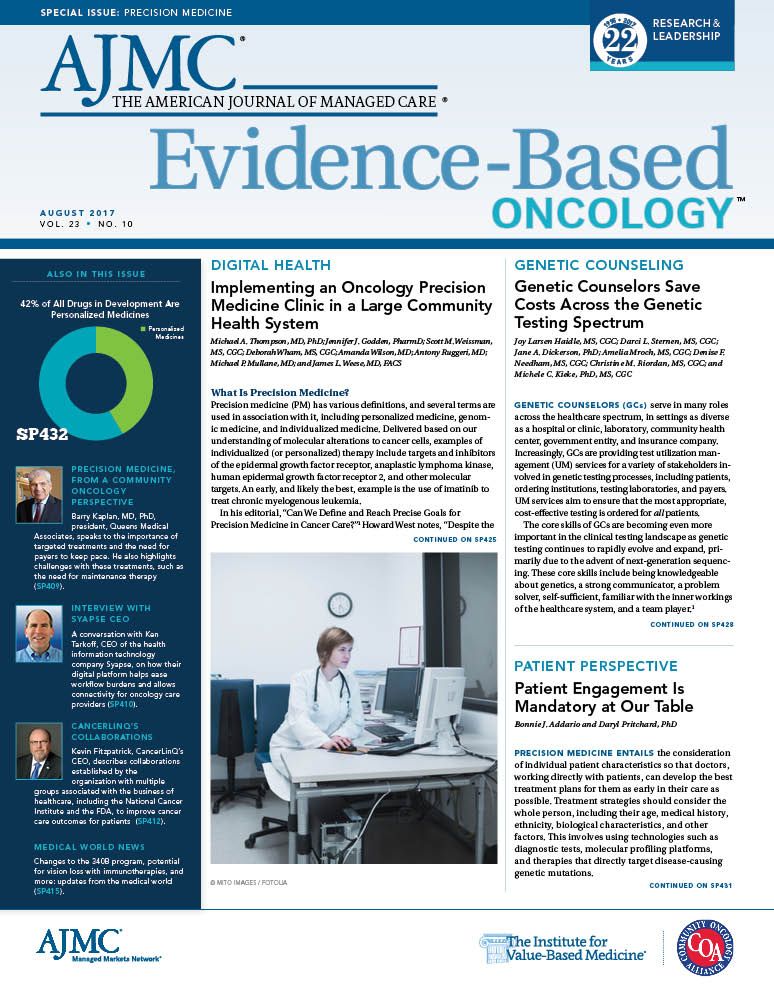- Center on Health Equity & Access
- Clinical
- Health Care Cost
- Health Care Delivery
- Insurance
- Policy
- Technology
- Value-Based Care
Letter to the Editors
A reaction to Institute for Clinical and Economic Review's value assessment framework by Eleanor M. Perfetto, PhD, MS, of The National Health Council.
To the Editors:
RIND AND EMONDS' RECENT ARTICLE,
“ICER’s Value Assessment Framework: Capturing the Patient Experience,”1 provides an overview of Institute for Clinical and Economic Review (ICER)’s enhanced focus on value from the patient’s perspective. The National Health Council (NHC) wholeheartedly supports engaging the patient community (patients, caregivers, advocates, and advocacy groups) to bring the patient voice to all value assessment efforts. ICER is to be commended for improvements implemented in its approach; however, we believe there is still a great deal of work to be done to truly establish robust health technology assessment strategies and tactics for meaningfully engaging the patient community. We have been and will continue to work with ICER and other value framework developers to achieve this goal.
In 2016, in an effort to increase and improve patient engagement in value assessment, the NHC launched a value initiative to support its patient-advocate membership,2 which includes:
- A value model rubric3 to clarify what constitutes patient-centeredness and engagement;
- A get-ready checklist4 to guide patient groups in engagement;
- A value workgroup to provide networking and information sharing through voluntary meetings of patient-organization staff who have worked with value framework developers;
- A qualitative study to provide insights on patients’ definitions of value; and
- A health economics educational program to inform the patient community on basic economic and value-assessment terms and principles.
All value framework developers need to remember that patient partnership, transparency, and inclusiveness are critical. Proactive patient-engagement opportunities are a must. ICER’s Patient Participation Guide outlines only reactive opportunities for patients—reactive opportunities represent a limited scope of engagement. In our comment letter5 to ICER on its proposed process changes, we encouraged developing proactive opportunities through which the patient community can partner to shape the questions, protocol, etc. We know ICER offers these opportunities, but the processes are unclear. ICER and all other framework developers are encouraged to create and disseminate transparent patient-engagement processes describing how patients can be engaged proactively as partners, as early as possible, start to finish, and how input is gathered and incorporated.
Collecting patient data on preferred outcomes and preferences is necessary—but not sufficient. These data must be fairly considered in value assessment. ICER and other framework developers’ emphasis on clinical trial data means clinical endpoints may differ from, and outweigh, the outcomes most important to patients.
It is vital for independent appraisal committees that make the critical voting decisions on a value assessment, to have the knowledge and context expertise of the relevant specific disease or disability. NHC believes that a robust patient engagement strategy ensures these committees have the relevant condition-specific expertise of patients.5
To reiterate, the NHC wholeheartedly supports ICER’s efforts to incorporate the patient voice, as highlighted in Rind and Emond’s article. We look forward to continuous collaboration with ICER to enhance the incorporation of the patient voice throughout the entire value assessment and framework development process.6
Sincerely,
Eleanor M. Perfetto, PhD, MS
AUTHOR INFORMATION
Eleanor M. Perfetto, PhD, MS, is senior vice president, Strategic Initiatives, The National Health Council.
ADDRESS FOR CORRESPONDENCE
Eleanor M. Perfetto, PhD, MS
Senior Vice President, Strategic Initiatives
1730 M Street NW, Suite 500
Washington, DC 20036-4561
202-973-0546
E-mail: eperfetto@NHCouncil.orgREFERENCES
1. Rind DM, Emond SK. ICER’s value assessment framework: capturing the patient experience. The American Journal of Managed Care® website. ajmc.com/journals/evidence-based-oncology/2017/ peer-exchange-spring-2017-oncology-stakeholders-summit/icers-value-assessment-framework- capturing-the-patient-experience. Published May 17, 2017. Accessed June 6, 2017.
2. Value initiative. National Health Council website. nationalhealthcouncil.org/value-initiative. Accessed June 5, 2017.
3. The patient voice in value: the National Health Council patient-centered value model rubric. National Health Council website. nationalhealthcouncil.org/sites/default/files/Value-Rubric.pdf. Published March 2016. Accessed June 5, 2017.
4. Value framework get-ready checklist for patient organizations. National Health Council website. nationalhealthcouncil.org/sites/default/files/Get_Ready_Checklist.pdf. Published September 2016. Accessed June 5, 2017.
5. NHC comments on ICER proposed update to value assessment framework and patient participation guide. National Health Council website. nationalhealthcouncil.org/sites/default/files/ NHC_Comments_ICER_ProposedUpdate_PatientParticipationGuide_040317_0.pdf. Published April 3, 2017. Accessed June 5, 2017.
6. Perfetto EM, Oehrlein EM, Boutin M, Reid S, Gascho E. Value to whom? The patient voice in the value discussion. Value Health. 2017;20(2):286-291. doi: 10.1016/j.jval.2016.11.014.

Quality of Life: The Pending Outcome in Idiopathic Pulmonary Fibrosis
February 6th 2026Because evidence gaps in idiopathic pulmonary fibrosis research hinder demonstration of antifibrotic therapies’ impact on patient quality of life (QOL), integrating validated health-related QOL measures into trials is urgently needed.
Read More
Exploring Racial, Ethnic Disparities in Cancer Care Prior Authorization Decisions
October 24th 2024On this episode of Managed Care Cast, we're talking with the author of a study published in the October 2024 issue of The American Journal of Managed Care® that explored prior authorization decisions in cancer care by race and ethnicity for commercially insured patients.
Listen
Building Trust: Public Priorities for Health Care AI Labeling
January 27th 2026A Michigan-based deliberative study found strong public support for patient-informed artificial intelligence (AI) labeling in health care, emphasizing transparency, privacy, equity, and safety to build trust.
Read More

